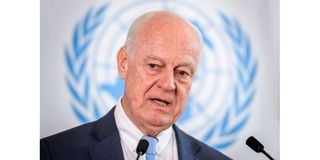UN names new envoy for Western Sahara

Staffan de Mistura.
United Nations Secretary-General Antonio Guterres on Wednesday named Italian diplomat Staffan de Mistura as his personal envoy for Western Sahara. This effectively restarts the process of seeking a permanent solution to the territory contested by Morocco.
Part of the Italian national's job will be to prevail upon the parties - Morocco and the Polisario Front backed by Algeria - to return to the table and agree on the future of the former Spanish colony that is claimed by Morocco.
Mr De Mistura will replace Horst Köhler of Germany, who left the seat in May 2019 after failing to revitalise the mediation.
“Mr De Mistura will provide good offices on behalf of the Secretary General. He will work with all relevant interlocutors, including the parties, neighbouring countries and other stakeholders, guided by Security Council resolution 2548 (2020) and other relevant resolutions,” the UN said on Wednesday.
A veteran diplomat, Mr De Mistura recently served as a special envoy of the Secretary General for Syria, where another crisis has persisted for years, dividing the UN Security Council’s permanent members.
He had also served as special representative of the Secretary General for Afghanistan and Iraq, personal representative of the Secretary General for Southern Lebanon and director of the UN Information Centre in Rome, according to his UN profile.
He is fluent in several languages including English, French, German, Italian, Spanish, Swedish and Arabic.
His appointment was immediately endorsed by the US government.
US Secretary of State Antony Blinken said his country “warmly welcomes” the appointment as it will bring “considerable expertise” from his past experience in Iraq, Lebanon and Syria.
Though claimed by Morocco, parts of Western Sahara have been under the Polisario Front, which runs an entity called the Sahrawi Arab Democratic Republic. Its government is exiled in Algerian refugee camps.
In 1981, Morocco had quit membership of the Organisation of African Unity, the precursor of the African Union. Morocco was protesting the organisation’s admission of the Sahrawi Arab Democratic Republic into its fold.
Morocco returned to the AU in 2017, having failed in its quest to join the European Union. But the question of the future status of Western Sahara remains unresolved, even though both are members of the AU.
In the past, the UN had tried mediation and the last personal envoy to break more ground was James Baker of the US, whose ‘Baker Plan’ for a referendum was initially endorsed by the UN Security Council before inaction crept in. He resigned in 2004.
And while countries like Kenya have called for Western Sahara’s ‘self-determination’ to be fulfilled, the question has always been who takes part in a referendum that could decide independence or autonomy for the region.
Both sides had, at one time, accepted a referendum but disagreed on the identity of voters before Morocco later refused to endorse any plebiscite that will involve deciding on independence.
The UN had been trying since 1988 when then Secretary-General Perez de Cuellar first made proposals to settle the question. Those proposals would have involved two choices: either people in Western Sahara integrate into Morocco or they go separate ways.
But as years went by, the sides disagreed on which population data to use. Polisario Front wanted the last Spanish census conducted on the territory in 1974 to be the basis, which would have meant that any Moroccan who moved to the territory afterwards would be locked out of the referendum.
This impasse stalled the referendum plan, and both sides eventually refused to engage.





